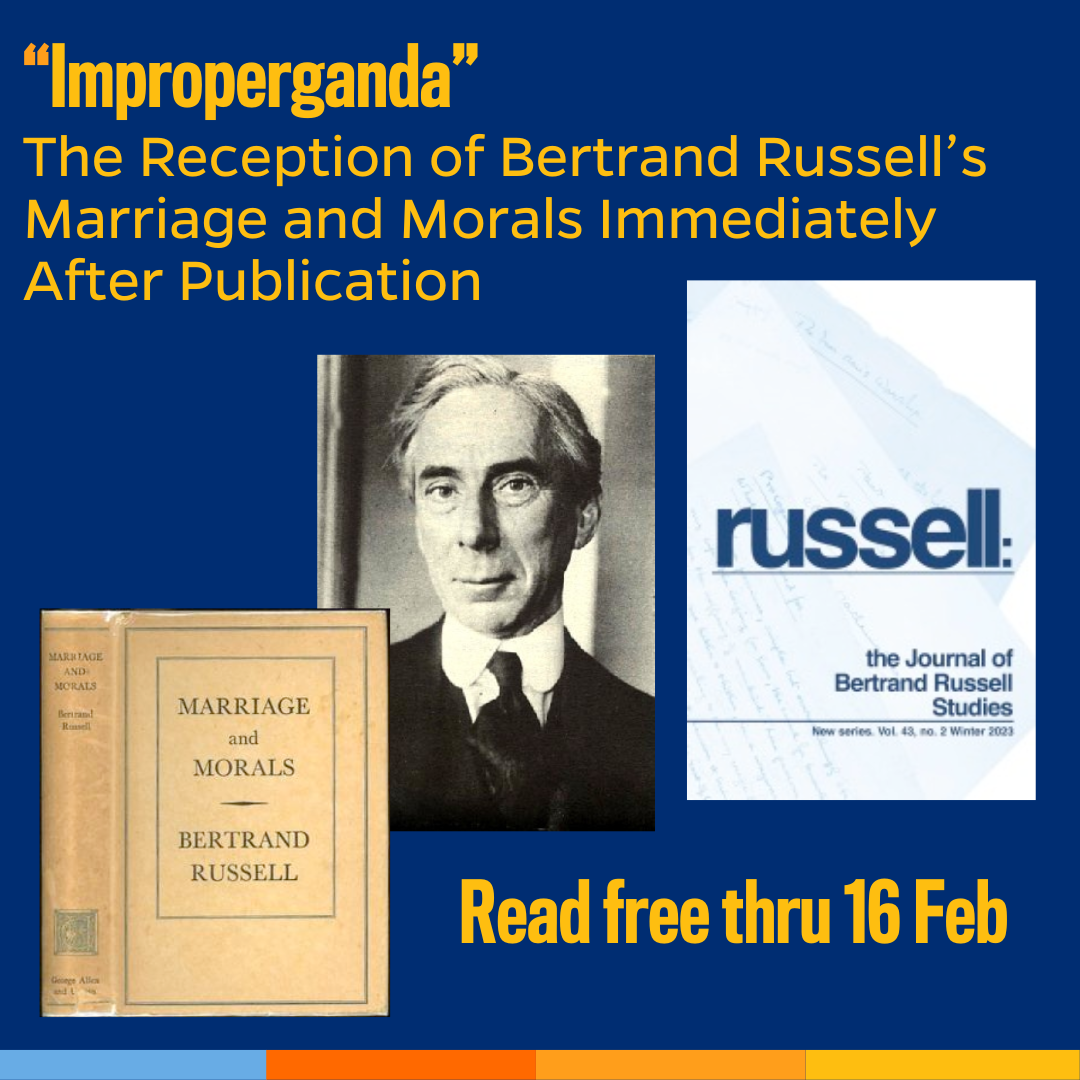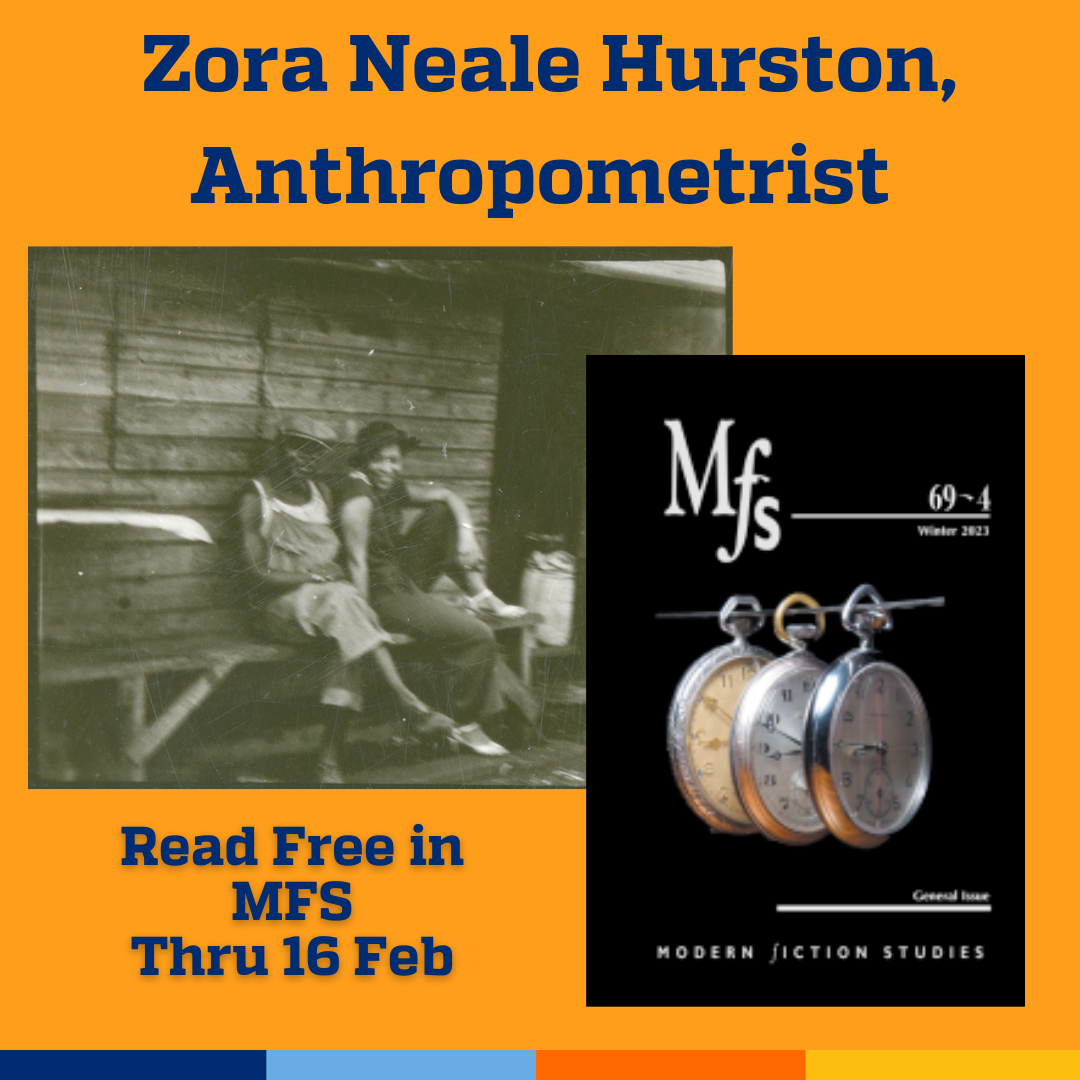
Johns Hopkins UniversityEst. 1876
America’s First Research University
ICYMI: New & Notable Articles (12 Feb 2024)


Nicole Falkenhayner
ariel: A Review of International English Literature
Volume 55, Number 1, January 2024
Reading Mohsin Hamid’s Exit West and Nnedi Okorafor’s Lagoon, Nicole Falkenhayner studies renegotiations of futurity, and anticipates a reshaping of utopian practice in times of global emergency
In the new ariel: A Review of International English Literature, free thru 16 Feb

Stephen Heathorn
Russell: The Journal of Bertrand Russell Studies
Volume 43, Number 2, Winter 2023
The public reaction to Bertrand Russell’s famous book, Marriage and Morals, is examined by Stephen Heathorn in the new issue of Russell: The Journal of Bertrand Russell Studies
Free to read through 16 Feb
Stephen Nachmanovitch
New Literary History
Volume 54, Number 3, Summer 2023
Polymaths are often admired for excelling in disparate fields — the ballerina/rocket scientist Kelley Hashemi, for instance
In “Being Whole,” Stephen Nachmanovitch poses a new category: a polymath who sees multiple fields as the same enterprise — the holomath
Read free at New Literary History thru 16 Feb

More Beautiful than Democracy: Toni Morrison and the Idea of a Shareable World
Lawrie Balfour
Theory & Event
Volume 27, Number 1, January 2024
“The function of freedom is to free somebody else"
In Theory & Event, Lawrie Balfour explores how Toni Morrison's work incites readers to look beyond existing democratic forms toward "a shareable world”
Read free thru 16 Feb

Dickens Quarterly
Volume 40, Number 1, March 2023
Celebrate Charles Dickens’ 212th birthday with an open access issue of Dickens Quarterly, an issue devoted to the author’s “favorite child,” David Copperfield

Managing Terrorism in Democracies
Joseph K. Young
South Central Review
Volume 40, Number 2-3, Summer/Fall 2023
Joseph K. Young discusses the challenges associated with how democracies can manage terrorist violence
Read free thru 16 Feb, part of a special double issue of South Central Review on “Terror and Commemoration”

Gina Surita
Bulletin of the History of Medicine
Volume 97, Number 3, Fall 2023
In Bulletin of the History of Medicine, Gina Surita considers the mid-20th Century establishment of "hormone-dependent cancers" as a biomedical category that cast androgens and estrogens as opposing ends of a gendered hormonal binary of health and disease

Laura Major
College Literature
Volume 51, Number 1, Winter 2024
Reading The No. 1 Ladies’ Detective Agency series through Homi Bhabha’s notion of hybridity, Laura Major recognizes locality, fluidity, and mutual influence in the construction of postcolonial identity in the popular, paradoxical novels
Read free in College Literature through 16 Feb

Zora Neale Hurston, Anthropometrist
Steven Nathaniel
MFS Modern Fiction Studies
Volume 69, Number 4, Winter 2023
Many know Zora Neale Hurston best for her work in fiction, but she began her career as a physical anthropologist and an acute critic of eugenic methods who anticipated the racism built in to modern facial recognition algorithms.
Read more at MFS Modern Fiction Studies, free thru 16 February

Andrew Kettler
Partial Answers: Journal of Literature and the History of Ideas
Volume 22, Number 1, January 2024
Early Modern English literature frequently invoked sulfur as the aroma of hell, demons and wickedness — until this perception began to shift with the Industrial Revolution “Dispersing the Devil’s Stench,” new in Partial Answers.
Read free through 16 February.

In Defense of Punks and Monsters: Julia Ducournau and Titane
Michèle Bacholle
The French Review
Volume 97, Number 2, December 2023
Julia Ducournau’s Titane won the Palme d’Or in 2021 for its portrayal of Alexia, a "monstrous" punk resisting normative limits. In The French Review, Michèle Bacholle considers Alexia as a character proposing a fluid, inclusive and caring society.
Read free through 16 February.

The Makings and Meanings of Childhood: Parents and the Juvenile Justice System in Interwar Palestine
Julia Shatz
Journal of the History of Childhood and Youth
Volume 17, Number 1, Winter 2024
In the new Journal of the History of Childhood and Youth, Julia Shatz studies the ways childhood was the political capital through which colonial power was both constructed and contested in the juvenile justice system of interwar Palestine.
Read free through 16 February.

Fernando Gomez Herrero and Frank B. Wilderson III
Diacritics
Volume 50, Number 4, 2022
New in Diacritics: A conversation with Frank Wilderson III, author of the monograph Afropessimism (2020), on the struggle of being a subject that can never travel from dispossession to redemptive recovery. Read free through 16 February.

"The Total Subversion of All Rule": Countering Slavery in Colonial and Imperial Contexts
Crystal Eddins and Zach Sell
Journal of Colonialism and Colonial History
Volume 24, Number 3, Winter 2023
The new Journal of Colonialism and Colonial History is a special issue focused on “Subversion, Slavery, and the Work of Empire.” Read the intro from guest editors Crystal Eddins and Zach Sell for free through 16 February

Urgent Archives: A How-To Guide
Ted Kerr
Feminist Formations
Volume 35, Issue 3, Winter 2023
“What does it mean to be the one who remembers?” asks Ted Kerr in Feminist Formations. What do we mean when we say ‘archives,’ and how do those archives relate to the future of BIPOC world-making, HIV/AIDS movements, and others?
Read free through 16 February.

Occupied Joy: The Politics of Skateboarding in Palestine
Ruba H. Akkad
American Quarterly
Volume 75, Number 3, September 2023
Explore the Palestinian youth skateboarding subculture as a site of quotidian anticolonial and anti-imperialist resistance, which Ruba H. Akkad calls “Occupied Joy”
Free to read in American Quarterly through 16 February.



